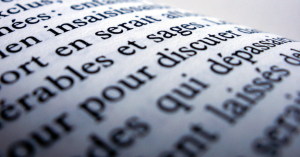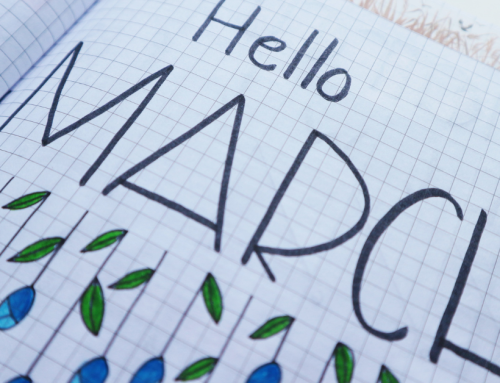
Guest Writer: Melanie Gagnon
Can I tell you a secret?
Here it is: French is a challenging language. I’m Francophone, and yet I find myself double-checking spelling and grammar all the time. And sometimes I still don’t get it right. Nouns have genders. Many letters in a word are unpronounced. And what is up with those accents?
But that doesn’t mean French isn’t worth learning. Here at CVS, on top of FSF1D (Grade 9 French), we also offer FSF2D (Grade 10 French). And while you might want to say “Au revoir” to French after Grade 9, here are some great reasons to keep at it.
Knowing French greatly improves your job prospects
Did you know that French was ranked at number 3 in Bloomberg’s list of most useful languages for business? French is definitely useful in the Canadian job market, since we have not one, but two official languages in this country. Not only that, but there is a decent sized segment of the population (22.8%) that speaks French as their first language. This means that, if you can speak French, you are a hot commodity in the Canadian job market. You’ll beat out those monolingual job seekers every time. Not only that, but companies will likely pay you more than your English-only colleagues.
Outside of Canada, French is a national language of more countries than any other language, except English. There are 300 million French speakers around the world. So if you want to work overseas, French is the language to know.
Want to work in politics, diplomacy, humanitarian aid, or sports? Learning French is a good idea, because it is the official language of the following organizations:
- The European Union
- The International Olympic Committee
- The International Red Cross
- The North Atlantic Treaty Organization (NATO)
- The United Nations Educational, Scientific and Cultural Organization (UNESCO)
- The United Nations
Knowing French enhances your travelling experience
Do you want to travel the world with confidence? Do you always want to understand and be understood? Learn French, and visiting places like France, Switzerland, Belgium, Monaco, Madagascar, Mauritius, Quebec, Luxembourg and French Polynesia will be a breeze. You’ll be able to order meals, understand directions, and avoid being swindled with ease.
Knowing French helps you to learn other languages
Knowing French also simplifies learning other languages, specifically Italian, Spanish, Portuguese and Romanian. Along with French, these languages are based on Latin and are structured in very similar ways. For example, take the word “Moon”. In French, the word is “la lune”. In Italian and Spanish, the word is “la luna”. In Portuguese, it’s “a lua”, and in Romanian, it’s “luna”. It would seem that the word doesn’t change much between these languages. The same can be said for sentence structures, verb conjugations and verb tenses, to name a few. I still remember struggling in Spanish class to figure out when to use which past tense, until I realized that these tenses function the same way in French. From that moment on, writing about what I did last summer, on the weekend or last night was simple comme bonjour (easy as pie).
French is the language of the arts
Did you know that French is the “international language of cooking, fashion, theatre, the visual arts, dance and architecture”? Mais oui ! English has even borrowed French words from some of these fields, such as à la carte, soufflé, sous-chef, apératif (for cooking), haute couture, avant-garde (for fashion), ballet, cabaret (dance) film noir, cinéma, and théâtre (for movies).
French speakers have clearly left their mark on the arts. France, for example, has produced the famous architect Gustave Eiffel, who built, obviously, la Tour Eiffel, and, less obviously, the internal structure of the Statue of Liberty. There are also many French writers, such as Victor Hugo, who wrote The Hunchback of Notre Dame and Les Misérables, Alexandre Dumas (The Three Musketeers and The Count of Monte Cristo) and Antoine de Saint-Exupéry, author of The Little Prince. France boasts famous composers such as Claude Debussy, Camille Saint-Saëns, and Georges Bizet, and painters like Claude Monet and Paul Cézanne. Fashion designer Coco Chanel was also French, as was Thierry Hermès, founder of the Hermès fashion house. Singer Édith Piaf (La vie en rose) had French origins, as do Thomas Bangalter and Guy-Manuel de Homem Christo, better known as the duo behind Daft Punk. The acting world also has its fair share of French actors such as Omar Sy (Lupin), Marion Cotillard (The Dark Knight Rises), and Léa Seydoux (Mission Impossible – Ghost Protocol).
The bottom line: French is an important language
Honestly, if you study French through high school and beyond, you really can’t go wrong. So next time you’re trying to figure out if the -ent at the end of a word should or should not be pronounced, or whether you need an -s or an -es at the end of an adjective, or what form of the past tense to use in a sentence, remember that the struggle is worth it; the French language is firmly entrenched in the world; it isn’t going anywhere. Knowing how to speak, write and read French, then, is a definite advantage.
And that’s why I say that French is awesome.

Melanie Gagnon is Christian Virtual School’s Grade 9 and 10 French teacher. She loves being able to share her love of languages with her students as well as teach her young son about life.




